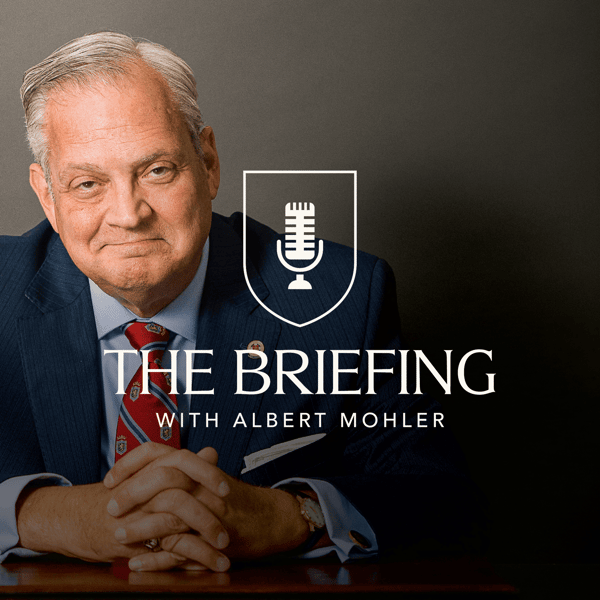Wednesday, March 19, 2025
The Briefing with Albert Mohler
The Southern Baptist Theological Seminary
4.8 • 7.9K Ratings
🗓️ 19 March 2025
⏱️ 26 minutes
🧾️ Download transcript
Summary
Part I (00:13 - 10:00)
How Do Humans Make Decisions, By Rational Thinking or Intuition? The Answer Isn’t As Rational As You Might Think
- Thinking, Fast and Slow by Macmillan Publishers (Daniel Kahneman)
Part II (10:00 - 17:27)
A Decision for Death? How Does Daniel Kahneman’s Assisted Suicide Fit into the Worldview of the Leading Expert on Decision Making?
- The Last Decision by the World’s Leading Thinker on Decisions by The Wall Street Journal (Jason Zweig)
Part III (17:27 - 20:56)
Life is Worth Living for God’s Glory – And Hedonic Pleasure is a Horribly Empty Rationale for Assisted Suicide
Part IV (20:56 - 25:34)
Atheism and Assisted Suicide: The Theology Behind the Final Decision of the World’s Leading Expert on Thinking
Sign up to receive The Briefing in your inbox every weekday morning.
Follow Dr. Mohler:
X | Instagram | Facebook | YouTube
For more information on The Southern Baptist Theological Seminary, go to sbts.edu.
For more information on Boyce College, just go to BoyceCollege.com.
To write Dr. Mohler or submit a question for The Mailbox, go here.
Transcript
Click on a timestamp to play from that location
| 0:00.0 | It's Wednesday, March 19, 2025. I'm Albert Mowler, and this is The Briefing, a daily analysis of news and events from a Christian worldview. |
| 0:14.4 | To be human is to think. We define ourselves, we name ourselves holosapians, the being who thinks, the conscious thinking being. |
| 0:23.8 | But as you know, even as that is a reflection of the fact that we are made in God's image, to be human is to think and eventually to think about thinking. |
| 0:32.7 | Now, that's something we acquire over time. A three-year-old thinks, but a three-year-old does not think about thinking. |
| 0:38.9 | On the other hand, a 13-year-old, well, he or she thinks about thinking. |
| 0:43.4 | That's a part of what makes 13 such an interesting age. |
| 0:46.8 | There have to be developments in the brain that allow for complex analytical cognition. |
| 0:51.8 | That is the ability to abstract yourself, to watch your own thinking, |
| 0:55.5 | to anticipate other minds at work. But this is not only a matter of practicality, it is also a |
| 1:01.3 | matter of economics, and no one made that point more famously than Daniel Kahneman, |
| 1:06.4 | one of the most influential economists in the world. His 2011 book entitled Thinking Fast and Slow |
| 1:13.8 | was the culmination of a work trying to think about thinking. It all began when he was a very |
| 1:20.7 | young boy and a teenager growing up in what would eventually become Israel was Palestine under the |
| 1:26.5 | mandate, and then eventually the nation of |
| 1:29.0 | Israel. He grew up as a Jewish boy with some of his family having fled Hitler, and he grew up |
| 1:35.4 | and went to high school there in Israel and then came to the United States. He eventually earned a PhD |
| 1:40.9 | in psychology there at the University of California at Berkeley. He was very interested |
| 1:46.1 | in how human beings think. That became an obsession, indeed. That was the main professional |
| 1:51.7 | interest of his life. He worked with others, including his very close associate, Amos Tversky, |
| 1:57.6 | and he worked on watching human beings think. Eventually, that led to the Nobel Prize in |
| 2:03.8 | Economics in 2002. So you have a person trained in psychology who wins the Nobel Prize in |
| 2:10.5 | economics and was considered one of the world's most influential economic thinkers, ranked |
... |
Please login to see the full transcript.
Disclaimer: The podcast and artwork embedded on this page are from The Southern Baptist Theological Seminary, and are the property of its owner and not affiliated with or endorsed by Tapesearch.
Generated transcripts are the property of The Southern Baptist Theological Seminary and are distributed freely under the Fair Use doctrine. Transcripts generated by Tapesearch are not guaranteed to be accurate.
Copyright © Tapesearch 2025.

